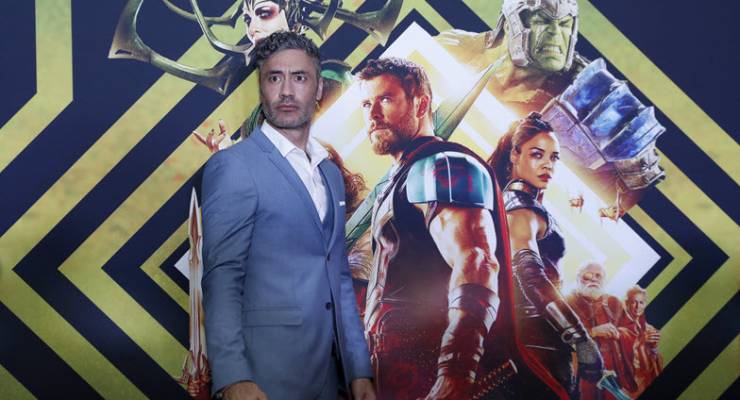
Image: Director Taika Waititi poses for a photo during the red carpet premiere of the Thor: Ragnarok
If the mood of big film and television conference Screen Forever is anything to go by, the industry is on an upswing. According to government film and television agency Screen Australia, 2016-17 was a record year for drama.
Six big foreign movies, led by the Taika Waititi superhero flick Thor: Ragnarok pumped $610 million into the sector. But locally initiated drama was even more important, accounting for $667 million. There were 41 Australian feature films and 46 Australian television drama titles in production this year. All told, the 2016-17 industry slate totals more than $1.3 billion.
The growth has flowed through to a bullish industry. Crikey spoke to a number of production companies at the conference that were expanding; one Sydney-based location scout has run out of places in New South Wales to shoot. Perhaps the most impressive success story is local streaming video play Stan, which has gone from a standing start to over 800,000 local subscribers in little more than a year.
According to Stan’s chief content officer Nick Forward, “we’re in this period of enormous growth and have been since we launched. It has been an interesting period establishing the brand and expanding out the content.”
While still trailing well behind Netflix for domestic subscriptions, Forward thinks there is plenty of room for both platforms in the Australian market. “We’re the big local player,” he argues. “Our product has been set up to be heavily differentiated from them, Netlifx is where you go for House of Cards, Stan is where you go for Better Call Saul.”
Stan is also commissioning local drama, with a TV series remake of Romper Stomper coming soon.
Screen Producers Australia CEO Matthew Deaner sounds a note of caution on the optimism, pointing out that in a fragmented sector, “there’s never a linear conversation about any of this stuff.” Deaner thinks the big players and the grassroots are travelling well, but senses some trouble in the middle.
“The middle part of the industry, there’s a bit of a no-man’s land there. There’s a struggle to keep that growth and momentum in the business. You see the same thing in the feature film industry, there’s big, big films, there’s a lot of little films, but there’s not as many middle-budget films, and that’s probably where there’s a bit of strain happening.”
Graeme Mason is the boss of government screen agency Screen Australia. “The drama report showed a record year in everything except kids,” he told Crikey in a phone interview. “The producer offset showed huge uplift in budget attributable to the offset, we have unbelievable success with Oscar nominations, we had multiple people in front and behind the camera with Emmy nominations, we’ve got more dramas than ever before on networks.”
But Mason also cautions that “it is an incredibly fragile ecosystem.” He argues that while the current health of the sector is driven by a strong government support, things could be very different should the policy settings change.
“We have quotas, we have the offset, we have direct investment, we have NIDA, we have the film and TV school, all of this is cultural capability building that allows us to have a flourishing sector,” Mason said. “If those things are changed, either by government, or the sector and the government doesn’t respond to the changing environment, I think that’s the real risk.”
If the sector seems worried, it may be because there are a number of government reviews of screen policy on the go at the moment. Most notably, Coalition backbencher Luke Howarth is currently chairing a parliamentary inquiry into the film and television industry. There’s considerable anxiety about what such an inquiry might recommend.
The policy mine-field is strewn with booby traps. While the producer offset has been extremely lucrative for the sector, it is also open-ended, making it an easy target for Treasury officials seeking to save some dollars in a constrained fiscal environment.
And then there is the thorny issue of what to do about big overseas players like Netlifx and Google, neither of whom currently face content quotas, unlike local television broadcasters. As streaming platforms take over the viewing habits of younger Australians, local content quotas are less and less relevant. When asked about quotas for streaming services, Stan’s Nick Forward would not be drawn.
Four of the major screen bodies have started a local content campaign, Make It Australian. Deaner warns that the sector is at risk of another “1970s moment”, where Australian screens will again be dominated by overseas content.
“You don’t know what you’ve lost until its gone,” he argues. “If you can’t see it, you can’t find, people start to switch off. Kids growing up on YouTube are starting to speak with American accents again.”








IMO the government should legislate local content quotas for Stan, Netflix etc. It’s the logical consequence of shifting viewing patterns, and would be good for both Australian culture and jobs.
…and watch Netflix depart Australia lest they allow a precedent be set to create a quota’s worth of local content in every country they operate. That said Netflix is already commissioning a few Australian productions to mixed reception: http://mashable.com/2017/04/20/monkey-tv-reboot-is-coming-to-netflix/.
Why not try providing a government subsidy for streaming providers which have a specified local content percentage in their programming? Sure, it’d place the providers in direct competition with the free-to-air channels and ABC/SBS – but it’s hardly like the government doesn’t already subsidise the free-to-air channels with not-at-all-politically-motivated license fee exemptions? And the quest to keep content within a specific ratio might have a positive knock-on effect on quality (which Netflix is currently struggling to maintain with some of its offerings).
Local content is certainly a good idea but how about producing films that aren’t based on 60s pulp commix for masturbatory boys?
Yeah, great. Stan: bringing you wholly unnecessary remakes of Romper Stomper and Wolf Creek – the latter an egregiously terrible idea, badly executed, with shocking acting and risible dialogue. The film was brutal, but a masterpiece. The series: utter trash, as one would expect from a partly Channel Nine production. Yuk, Stan, yuk.